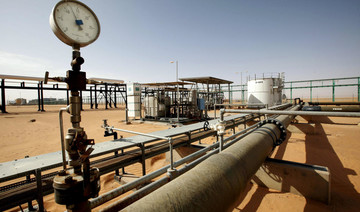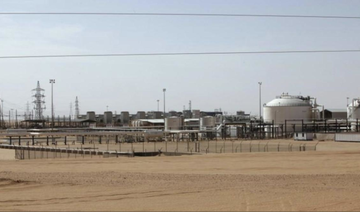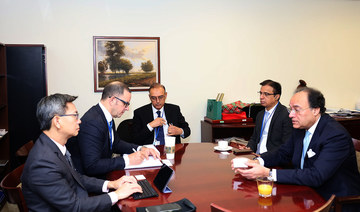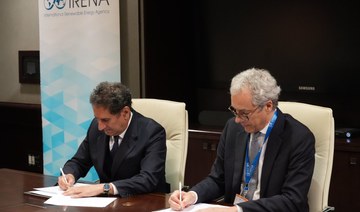SINGAPORE: Oil prices edged up on Tuesday after Libya’s National Oil Company declared force majeure on exports from the El Sharara oilfield, which was seized at the weekend by a local militia group.
Despite that, overall sentiment on oil prices remained weak amid worries over global stock markets and doubts that planned supply cuts led by producer club OPEC will be enough to rein in oversupply.
International Brent crude oil futures were at $60.19 per barrel at 0336 GMT, up 19 cents, or 0.3 percent, from their last close.
US West Texas Intermediate (WTI) crude futures were at $51.16 per barrel, up 16 cents, or 0.3 percent.
Libya’s National Oil Company (NOC) late on Monday declared force majeure on exports from the El Sharara oilfield, the country’s biggest, which was seized at the weekend by a militia group.
NOC said the shutdown would result in a production loss of 315,000 barrels per day (bpd), and an additional loss of 73,000 bpd at the El Feel oilfield.
The rise came after crude prices dropped by 3 percent the session before amid ongoing weakness in global stock markets and concerns that slowing oil demand-growth could erode supply cuts announced last week by the Organization of the Petroleum Exporting Countries (OPEC) and some non-OPEC producers including Russia.
Crude futures have lost around a third of their value since early October amid the financial market slump and an emerging oil supply overhang.
In a show of no confidence, money managers cut their bullish wagers on crude to the lowest in more than two years in the week ending Dec. 4, the US Commodity Futures Trading Commission (CFTC) said on Monday.
The financial speculator group cut its combined futures and options position in New York and London by 25,619 contracts to 144,775 during the period. That is the lowest level since Sept. 20, 2016.
In physical markets, Kuwait and Iran this week both reduced their January crude oil supply prices to Asia
“There remains a lot of uncertainty if the production cut is thick enough to make a significant dent in global supply,” said Stephen Innes, head of trading for Asia-Pacific at futures brokerage Oanda in Singapore.
“The general risk-off tone in global markets and the stronger dollar ... are contributing to the selling pressure.”
The OPEC-led group of oil producers last Friday announced a supply cut of 1.2 million barrels per day (bpd) in crude oil supply from January, measured against October 2018 output levels.
Oil prices rise on Libyan export interruption, but markets remain weak
Oil prices rise on Libyan export interruption, but markets remain weak

- The rise came after crude prices dropped by 3 percent the session before amid ongoing weakness in global stock markets and concerns that slowing oil demand-growth could erode supply cuts
- Crude futures have lost around a third of their value since early October amid the financial market slump and an emerging oil supply overhang
Pakistan eyes new IMF loan by early July, finance minister says
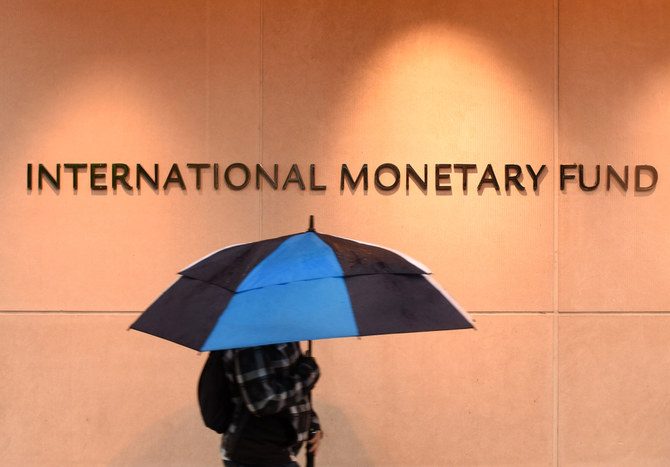
PAKISTAN: Pakistan could secure a staff-level agreement on a new long-term larger loan with the International Monetary Fund by early July, its finance minister said on Tuesday, according to Reuters.
The country’s current $3 billion arrangement with the fund — which it secured last summer to avert a sovereign default — runs out in late April.
The $350 billion South Asian economy faces a chronic balance of payment crisis. The government is seeking a larger, long-term loan to help stabilize economic activity and financial markets so it can execute long-due, painful structural reforms.
If secured, it would be the 24th IMF bailout for Pakistan.
“We are still hoping that we get a staff-level agreement by June or early July,” Finance Minister Muhammad Aurangzeb told a conference in Islamabad.
He returned from Washington last week after leading a team to attend the IMF and World Bank’s spring meetings.
“We had very good discussions in Washington,” he said.
He said he did not know at this stage the volume and tenure of the longer program, although he has previously said that he was looking for at least a three-year bailout plan.
Both sides have said they were already in discussions for the new loan. A formal request, however, will be made once the current facility expires, with the IMF board likely to meet late this month to approve the second and last tranche of the current support scheme.
The economy is expected to grow by 2.6 percent in the fiscal year 2024, the finance minister said, adding that the inflation was projected at 24 percent, down from 29.2 percent in fiscal 2023. It touched a record high of 38 percent last May.
Aurangzeb said structural reforms would include increasing the government’s tax revenue-to-GDP ratio to 13 percent to 14 percent in next two or three years from the current level of around 9 percent, reducing losses of state-owned enterprises through their privatization, and better management of the debt-laden energy sector.
Oil Updates – prices stabilize, Middle East tensions remain in focus

NEW DELHI: Oil prices edged higher on Tuesday, after falling in the previous session, as investors continued to assess the risk from geopolitical concerns in the Middle East, according to Reuters.
Global benchmark Brent crude oil futures traded 18 cents higher at $87.18 a barrel by 9:34 a.m. Saudi time, and US West Texas Intermediate crude futures also gained 16 cents to $82.06 a barrel.
Both benchmarks fell 29 cents in the previous session on signs that a recent escalation of tensions between Israel and Iran had little near-term impact on oil supplies from the region.
“The unwinding of geo-political risk premium has dented crude oil prices recently as supply was not disrupted meaningfully,” said Sugandha Sachdeva, founder of Delhi-based research firm SS WealthStreet.
But the evolving geopolitical landscape remains critical in steering crude oil prices, she said.
“While there are no indications of an imminent full-scale war between the countries involved, any escalation in tensions could quickly reverse the current trend,” Sachdeva added.
ANZ analysts echoed the sentiment and highlighted US approval of new sanctions on Iran’s oil sector that broaden current sanctions to include foreign ports, vessels and refineries that knowingly process or ship Iranian crude.
Also, EU foreign ministers agreed in principle on Monday to expand sanctions on Iran after Tehran’s missile and drone attack on Israel, the bloc’s foreign policy chief Josep Borrell said.
“The geopolitical backdrop is still very fraught with so many risks at the moment, so clearly we’re going to see a lot of volatility until there’s a lot more clarity around it,” the ANZ analysts said in a podcast.
Israeli troops fought their way back into an eastern section of Khan Younis in a surprise raid, residents said on Monday, sending people who had returned to abandoned homes in the ruins of the southern Gaza Strip’s main city fleeing once more.
Investors are waiting for the release of the US gross domestic product figures and the March personal consumption expenditure data — the Fed’s preferred inflation gauge — later this week to assess the trajectory of monetary policy.
US crude oil inventories are expected to have increased last week while refined product stockpiles likely fell, according to a preliminary Reuters poll of analysts.
“Sticky US inflation figures, hawkish statements from key Fed officials, and rising US inventories are all acting as constraints on crude oil price growth,” Sachdeva said.
Pakistan hopes to get new IMF loan by early July, says finance minister
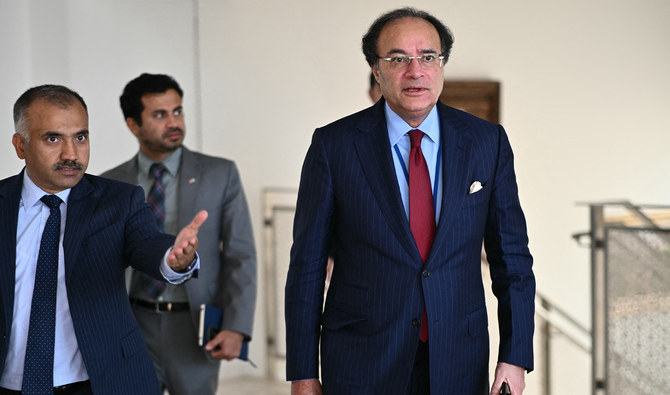
- Pakistan’s current $3 billion financial arrangement with IMF expires in late April
- Islamabad is seeking “bigger,” long-term loan to ensure macroeconomic stability
Pakistan is hoping to reach a staff-level agreement with the International Monetary Fund by June or early July, its finance minister said on Tuesday.
The country’s current $3 billion arrangement with the fund runs out in late-April, which it secured last summer to avert a sovereign default.
Islamabad is seeking a long-term bigger loan to help bring permanence to macroeconomic stability as well as an umbrella under which the country can execute structural reforms.
“We are still hoping that we get a staff-level agreement by June or early July,” Finance Minister Muhammad Aurangzeb told a conference in Islamabad.
He returned from Washington last week after leading a team to attend the IMF and World Bank’s spring meetings. “We had very good discussions in Washington,” he said.
He said he did not know at this stage the volume and tenure of the longer program.
Riyadh prepares to host special meeting of World Economic Forum

- The aim of the gathering is to find solutions to global challenges relating to humanitarian issues, the climate and the economy
RIYADH: Final preparations are taking place this week in the Saudi capital, Riyadh, for a special meeting of the World Economic Forum in the city on April 28 and 29.
Heads of state and senior executives from the public and private sectors are expected to be among the participants, who will discuss a range of global economic issues and developments under the theme “Global Collaboration, Growth and Energy for Development.”
The aim of the meeting is to find solutions to a host of global challenges relating to humanitarian issues, the climate and the economy. On the sidelines of the main event, the Kingdom will host exhibitions and other events to highlight the latest developments and trends in areas such as sustainability, innovation and culture.
The selection of Riyadh as host of the special meeting reflects the extensive partnership between Saudi Arabia and the WEF, officials said.
It builds upon the Kingdom’s active participation and contributions to the WEF’s Annual Meetings in Davos.
The agenda is designed to rekindle the spirit of cooperation and collaboration with various panel discussions, workshops, and networking opportunities. It represents a significant gathering of global leaders and experts dedicated to forging a path toward a more resilient, sustainable, and equitable world.
ACWA Power inks deal to drive renewable energy development in Azerbaijan
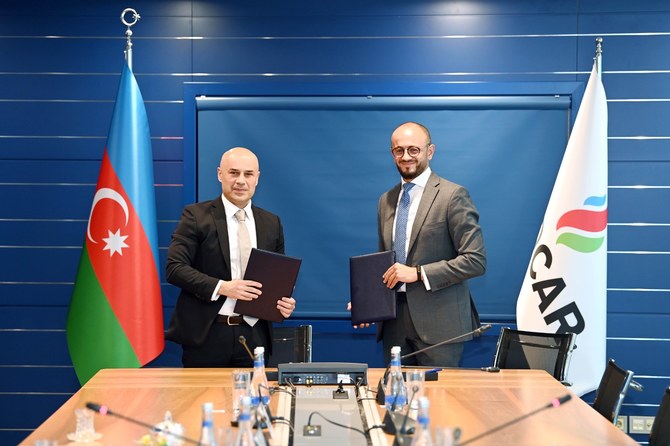
RIYADH: Saudi energy giant ACWA Power is signing a new agreement to accelerate the development of renewable projects in Azerbaijan.
The private water desalination company, known for its extensive green hydrogen storage capacity, announced it has now finalized an agreement with SOCAR, the State Oil Company of the Azerbaijan Republic.
This development follows an initial cooperation understanding signed in February 2023.
This deal focuses on the joint evaluation of the “Low-Carbon/Green Fertilizer” project, in which the two bodies will collaborate on assessing the production of green hydrogen to support the decarbonization of SOCAR downstream assets.
Marco Arcelli, CEO of ACWA Power, said in a statement, “I am proud to announce our collaboration with SOCAR to ignite a new era of renewable energy development in Azerbaijan. With our shared vision and commitment to sustainability, this partnership will not only drive innovation but also pave the way for a cleaner and brighter future for this country.”
The primary directive of the agreement will be to enhance SOCAR’s carbamide fertilizer facility, striving toward more value-added low-carbon products.
As part of the project, SOCAR and ACWA Power will conduct feasibility studies to assess the potential production and sale of green fertilizers, aligning with Azerbaijan’s vision of achieving a clean environment.
ACWA Power will take a role in driving the project’s renewable energy and green hydrogen production aspects, bringing their expertise to bear on this initiative.
For his part, Anar Mammadov, vice president of SOCAR, said, “Azerbaijan is committed to building a sustainable future, and our partnership with ACWA Power underscores our shared dedication to driving renewable energy development in the region. Together, we will work towards realizing our vision of a cleaner, greener Azerbaijan.”
He added: “The cooperation with ACWA Power represents a significant step forward in Azerbaijan’s transition towards a low-carbon economy and underscores the commitment of both organizations to sustainable development practices.”
Preceding this announcement, the two nations posed their intent to collaborate on renewables as Saudi Arabia’s Minister of Energy Prince Abdulaziz bin Salman met with Azerbaijan’s Minister of Environment and Natural Resources Mukhtar Babayev in March.
During the meeting, the counterparts discussed opportunities for work and cooperation between their two countries in the field of climate change.
They also talked about joint efforts to achieve the goals of the UN Framework Convention on Climate Change and the Paris Agreement, the Kingdom’s ministry said in a statement at the time.


